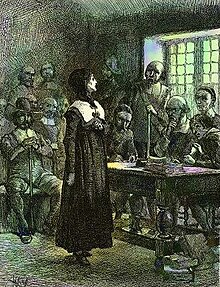Anne Hutchinson
| Anne Hutchinson | |
|---|---|

Anne Hutchinson on Trial by Edwin Austin Abbey
|
|
| Born |
Anne Marbury baptised 20 July 1591 Alford, Lincolnshire, England |
| Died | August 1643 (aged 52) New Netherland (later The Bronx, New York) |
| Education | Home schooled and self-taught |
| Occupation | midwife |
| Known for | Role in the Antinomian Controversy |
| Spouse(s) | William Hutchinson |
| Children | Edward, Susanna, Richard, Faith, Bridget, Francis, Elizabeth, William, Samuel, Anne, Mary, Katherine, William, Susanna, Zuriel |
| Parent(s) | Francis Marbury and Bridget Dryden |
| Relatives | Grandmother of Governor Peleg Sanford Great great grandmother of Governor Thomas Hutchinson Ancestor of U.S. Presidents Franklin D. Roosevelt, George H. W. Bush and George W. Bush |
Anne Hutchinson (née Marbury; July 1591 – August 1643) was a Puritan spiritual adviser, mother of 15, and an important participant in the Antinomian Controversy which shook the infant Massachusetts Bay Colony from 1636 to 1638. Her strong religious convictions were at odds with the established Puritan clergy in the Boston area, and her popularity and charisma helped create a theological schism that threatened to destroy the Puritans' religious community in New England. She was eventually tried and convicted, then banished from the colony with many of her supporters.
Hutchinson was born in Alford, Lincolnshire, England, the daughter of Francis Marbury, an Anglican cleric and school teacher who gave her a far better education than most other girls received. She lived in London as a young adult, and there married her old friend from home William Hutchinson. The couple moved back to Alford where they began following dynamic preacher John Cotton in the nearby port of Boston, Lincolnshire. Cotton was compelled to emigrate in 1633, and the Hutchinsons followed a year later with their 11 children and soon became well established in the growing settlement of Boston in New England. Anne was a midwife and very helpful to those needing her assistance, as well as forthcoming with her personal religious understandings. Soon she was hosting women at her house weekly, providing commentary on recent sermons. These meetings became so popular that she began offering meetings for men as well, including the young governor of the colony Henry Vane.
As a follower of Cotton, she espoused a "covenant of grace," while accusing all of the local ministers (except for Cotton and her husband's brother-in-law John Wheelwright) of preaching a "covenant of works." Many ministers began to complain about the opinions coming from Hutchinson and her allies, and the situation erupted into what is commonly called the Antinomian Controversy, resulting in her 1637 trial, conviction, and banishment from the colony. This was followed by a March 1638 church trial in which she was excommunicated.
...
Wikipedia
